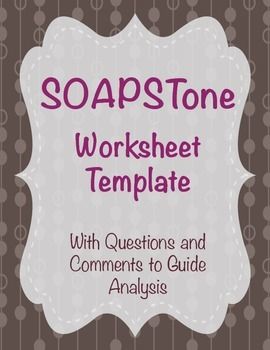|
Students will find it useful to analyze primary source material regularly to deepen their understanding of the key concepts addressed in the AP World History course and to practice the required historical thinking skills. These sources must include each of the following types: written documents, maps, images, quantitative data, and works of art.
|
SOAPSToneSOAPSTone (Speaker, Occasion, Audience, Purpose, Subject, Tone) is an acronym for a series of questions that, when answered, will help you to interpret primary sources effectively.
|
SOAPSTone WorksheetThis SOAPSTone (Speaker, Occasion, Audience, Purpose, Subject, Tone) worksheet will help you to interpret primary sources effectively.
|
Power Words & Transitions for WritingWhen writing for a history course you will often be constructing arguments to answer a question or relay information. Creating and justifying a strong argument is part of analysis. To illustrate your mastery of writing and analysis, there are some words you can use to help the reader understand your points.
|



